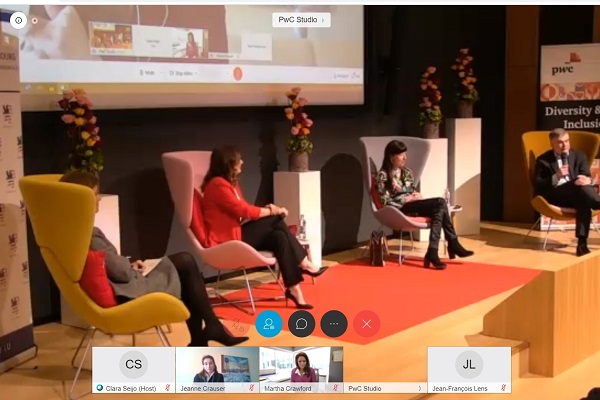
On Monday 8 March 2021, PwC Luxembourg and the American Chamber of Commerce in Luxembourg (AMCHAM), together with the Luxembourg American Chamber of Commerce New York, held their fourth International Women’s Day panel presentation.
The event, entitled "Disruptive times: opportunities and challenges for gender balance?", brough together the following expert speakers: Julie Becker, Deputy CEO and future CEO (as of 21 April 2021) of Luxembourg Stock Exchange (LuxSE); Jeanne Crauser, Consulate General of Luxembourg in New York and Executive Director of Luxembourg Trade and Investment Office (LTIO), who joined virtually from New York; Martha Crawford, Dean of the Jack Welch College of Business & Technology, who also joined virtually from Connecticut in the United States; Claude Marx, Director General of the Financial Sector Supervisory Commission (Commission de Surveillance du Secteur Financier - CSSF); Françoise Thoma, CEO of Banque et Caisse d’Épargne de l’État (BCEE).
John Parkhouse, CEO and Senior Partner at PwC Luxembourg, introduced the panel discussion by emphasising the impact of the COVID-19 impact on business and particularly people (regardless of gender). He recognised the impact of women specifically in leading us through this crisis, from both a leadership and frontline worker perspective, but also recalled that the crisis had had a disproportionate impact on jobs for women. He added that there was a real risk of the pandemic diverting attention away from diversity and inclusion. That being said, the pandemic has accelerated many trends, namely in terms of technology but also broader sustainability.
During the panel discussion, which was moderated by Nathalie Reuter, the panellists discussed various topics from how their respective companies / organisations' activities had been impacted by COVID-19 to women in management, as well as the economic recovery and the crisis as an accelerator. At the start of the pandemic, many companies, including LuxSE and CSSF, quickly switched to remote working. Others, such as the Consulate General and LTIO struggled as they had to close everything; "communication was critical" explained Jeanne Crauser. For banks such as the BCEE, closing down was not an option, according to Françoise Thoma, who explained that they had closed some branches but left enough open to guarantee customer access to banking services. She added that the crisis had served as an "accelerator for trends that would have come anyway", especially in terms of technology. The Jack Welch College of Business & Technology in Connecticut switched to 100% remote learning in early-March 2020 but has since adopted a hybrid teaching mode.
On the subject of teleworking, there was general consensus that this form of working every day was not necessarily beneficial for every employee; some people cannot work from home due to a lack of equipment or space and there are different psychological considerations to take into consideration.
Regarding leadership and management styles, Françoise Thoma emphasised the need to listen and adapt to people's concerns and needs. Claude Marx agreed that leaders had had to continuously adapt, taking into consideration employees' mental health and showing empathy. He added that women did seem to have a different management style, but remainly "largely under-represented in manager and director roles". For Mr Marx, the solution to this is to first incentivise people to change this situation on their own. If things change too slowly, only then should quotas be introduced. François Thoma agreed, adding that the best solution was "to lead by example and inspire people to be inclusive". Julie Becker added that before introducing quotas, we first need to sustain changes which have already been made.
Regarding the disproportionate impact of the crisis on women, the panellists addressed gender equality at home as well as in the workplace. Martha Crawford stressed that in many US states where schools have been closed for a year now, the situation has been more disruptive for parents of younger children and has accentuated male-female disparity. Jeanne Crauser added that there was also a divide between wealthier and less wealthy families in the US, where partners cannot always share equal responsibilites at home if one of them has to go to work to survive.
On the subject of economic recovery, Claude Marx said he was mostly optimistic, although the crisis is not yet over. He stressed the need to continue subsidising the economy and supporting businesses rather than letting the latter fail. François Thomas agreed, adding that the Luxembourg economy was more resilient than others thanks to "huge government support".
There was again general consensus among the panellists that COVID-19 had served as an accelerator for many sectors, particularly concerning the digital transformation (both in Luxembourg and the US).
The panellists concluded by sharing their own take aways from the crisis; they spoke of the importance of communication, transparency and flexibility and how some things which seemed essential pre-pandemic (such as in-person meetings) were not and things which did not seem essential actually were. Martha Crawford stressed the need to understand the difference between being appreciated and being valued, using empathy to evolve your organisation and adapting your management style to employees' needs.
All participants agreed that another International Women's Day panel discussion would be needed next year, as well; things are going in the right direction but, as Julie Becker noted, we are "not yet there".
AMCHAM Chairman and CEO Paul Schonenberg wrapped up this year's event. He recognised that we have all gone through an "extraordinary disruptive time" which has been both a challenge and an opportunity "to do things better, to do things differently" as individuals and society.








